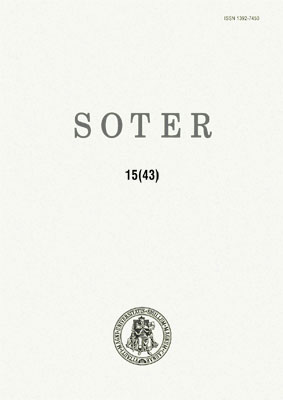Biblinės dramos ženklai ikiegzilinėje Bernardo Brazdžionio poezijoje
The Signs of the Biblical Drama in the Pre-Exile Poetry of Bernardas Brazdžionis)
Author(s): Silvija RakutienėSubject(s): Christian Theology and Religion
Published by: Vytauto Didžiojo Universitetas
Keywords: Bernardas Brazdžionis; biblija; ikiegzilinė poezija; religinė poezija; literatūrinės parafrazės; transcendencija; modernizmas; bible; pre-exile poetry; religious poetry; literary paraphrases; transcendence; modernism
Summary/Abstract: Šio straipsnio tikslas – patyrinėti vieno žymiausių lietuvių poetų – B. Brazdžionio kūryboje atsiskleidžiančias laiko, erdvės bei žmogaus sampratas, atskleisti religinio patyrimo išgyvenimo specifiką, atsekti universaliųjų biblinių tiesų sklaidą ikiegziliniuose jo eilėraščiuose bei atverti vidinį jo poezijos religingumą. Siekiama atskleisti ne tiek religinių tiesų atspindėjimą eilėraščiuose, kiek gilų ir sudėtingą Dievo išgyvenimą, kai Transcendencija tampa žmogaus egzistencijos pagrindu. Biblinės išganymo istorijos ženklai pašventina B. Brazdžionio eilėraščių pasaulį, suteikia jam transcendentinį laiko ir erdvės matmenį. Biblinė istorija išsipildo šiame laike ir šioje erdvėje, įtraukdama į vyksmą ir modernaus pasaulio žmogų. Bernardas Brazdžionis struggled to modern the space of the narrative, to renovate the structures of poetry and to release the literary speech like it was done by the Lithuanian representatives of avantgarde. His poetry was influenced by the ideas of neo-catholicity. The poet was trying to reveal the human and divine subsistence. B. Brazdžionis continued the paradigm of traditional-simulative relation to Bible, but traditional biblical genres - prophesy, prayer, psalm - were receding from canons, they were individualized. The poems were given the intonation of the prayer, the dialogical tone was stressed. The poetry of Bernardas Brazdžionis was coherent to the tradition of Christian homiletics and to the poetic treatment of it. Bible and the system of its images is the main code of his poems. The poet was looking for the characters, motifs, imagery and literary paraphrase there. All the semantic and stylistic figures showed the particular poetic code. The poetry of B. Brazdžionis could be read as prophesy. The universal verities were the most important for the poet. He presented religious themes in the new light, harmonized oratorical and prosaic styles. The catastrophe of human life was understood in the wider context. The realities of the poems - alienation and unity, death and resurrection, the Lost and the Recovered Paradise helped us to look for answers where literature met the faith.
Journal: SOTER: religijos mokslo žurnalas
- Issue Year: 43/2005
- Issue No: 15
- Page Range: 215-231
- Page Count: 17
- Language: Lithuanian

